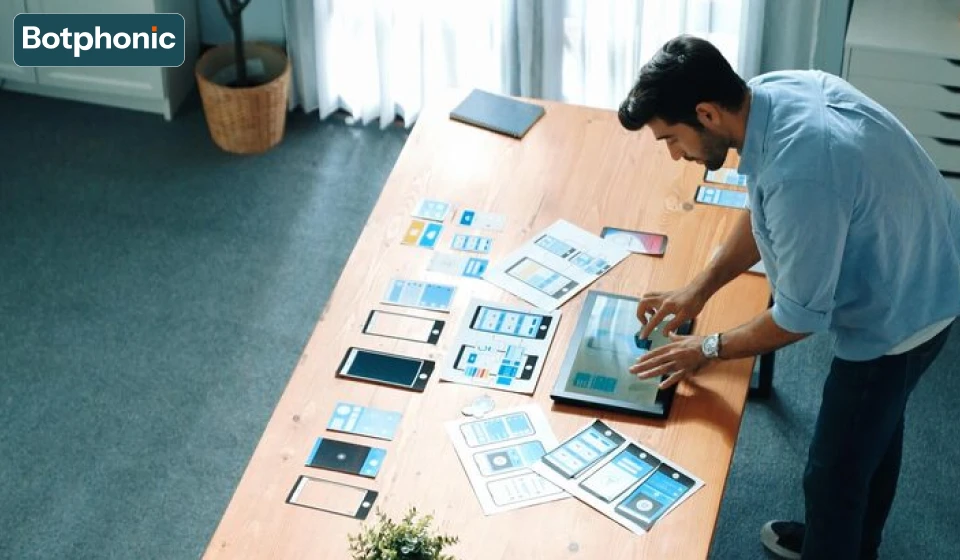
Summarize Content With:
Summary
In this blog, we will discuss how the best automated phone system for small businesses simplifies the procedure, enhances professionalism, and propels scalability. You will know about the essential characteristics, most promising solutions of 2025, effective installation tricks, and professional recommendations that allow making an informed decision in favour of an appropriate company.
Key Takeaways
- A smartphone-based system offers 224-hour coverage, intelligent call routing, and substantial cost reductions.
- Small businesses get a professional advantage and a better customer experience without increasing workforce.
- Its modern solution will integrate with CRM, provide analytics and be easily scalable as your operation expands.
- Choosing the best solution will depend on the needs of your business, budget, and the capabilities of the features.
Introduction
Small business management may seem like an attempt to do a hundred things simultaneously, and answering phones is only one of them. The point is, an unanswered telephone call may turn out to be a lost client, and a long time spent waiting on the phone might hurt your image.
So you have a vision now: an intelligent system that takes calls immediately, directs your customers to the right place, and operates both day and night, even when you may already be busy, serving other customers, or having fun on the weekend. That’s exactly what an automated phone system for small business can do.
In this guide, we’ll break down
- The nature of automated phone systems and the principle behind them
- What makes them a game changer for small businesses
- The features that you must consider
- Solutions with the best forecasts in 2025 (with a detailed comparison)
- Hands-on engagement, quick setup, and rapid adoption tips
At this point, you will feel confident about how to select the right system to save time, reduce costs, and create a professional experience with your customers that sets you apart.
What Is an Automated Phone System?
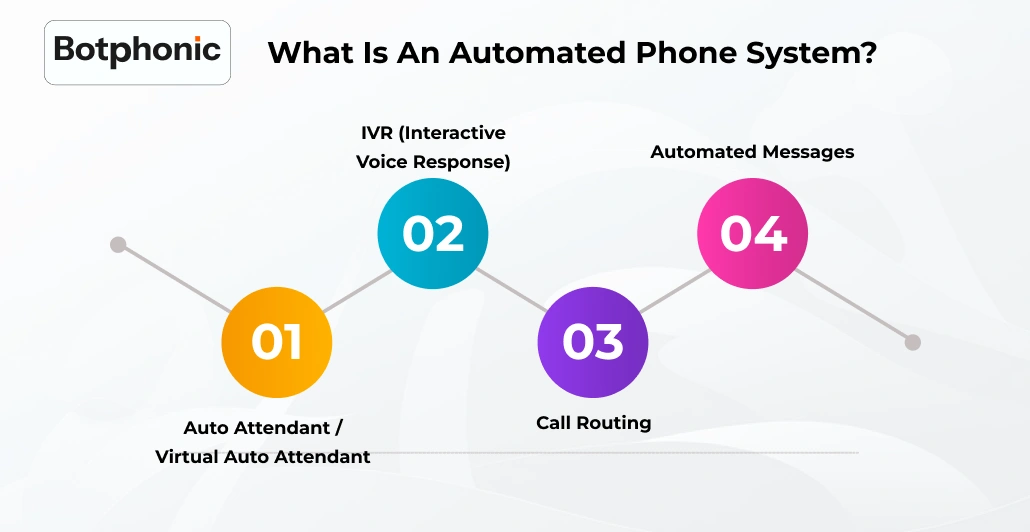
The auto phone system of a small business defines a telecommunication solution, which is based on software and complex hardware to answer, route, and control the call automatically, eliminating the need for a live receptionist.
Key Components
- Auto Attendant / Virtual Auto Attendant: The first program starts off greeting people and transferring calls by department or individual caller.
- IVR (Interactive Voice Response): Allows customers to press the buttons on the keypad or call using their voice to navigate menus and access support or information.
- Call Routing: Smartly routes calls in terms of time, query or availability.
- Automated Messages: Plays individual messages, updates, or reminders about an appointment.
Differences from Traditional Phone Systems
| Aspect | Traditional Phone | Automated Phone System for Small Business |
| Call Handling | Manual, staff-based | Automated, self-service |
| Availability | Office hours only | 24/7, no breaks |
| Scalability | Difficult, costly | Easy, flexible, affordable |
| Integration | Limited | CRM, analytics, multi-channel support |
Why Small Businesses Need Automated Phone Systems
Key Challenges:
Smaller companies usually find it difficult to:
- Lost chances when a phone is not picked up.
- Most expenses (receptionists, telephone lines)
- Unsatisfactory customer experiences because of long wait lines or misdirected calls
- Problems with increasing the volume of calls as the company expands
How Automation Solves These Problems
Automatic phone systems enable companies to
- Always Be There: You never want to miss a client or service call-the systems are up and running 24/7/365. Businesses that integrate AI customer service solutions ensure every caller is handled efficiently, no matter the time zone or workload.
- Call Filters: Blocks spam, robo-calls, and unwanted callers, saves time, and preserves employee attention.
- Smart routing: increases customer satisfaction by decreasing the time they have to wait.
- Cost: Saves on the use of costly receptionists and numerous phone lines. The cloud systems and VoIP systems are much cheaper to operate.
- Scalability: Scale up to meet your call volume instantly using cloud plans and ease of user management.
Sign up for a free demo with Botphonic AI now and see the difference for yourself.
Request a Free DemoCore Features of Modern Automated Phone Systems
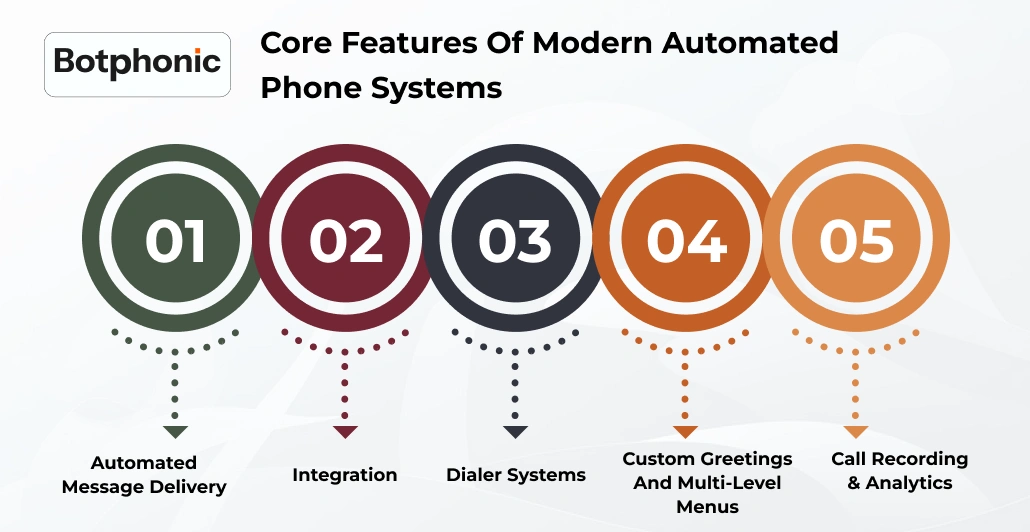
Call Routing and Virtual Auto Attendants: Allows customers to be directed to the correct department, place, or agent without the intervention of individuals. This is where an AI call assistant can make the routing process even smarter, using natural language understanding to connect customers faster.
- Automated Message Delivery: Plays educational messages, appointment reminders and offers, among others.
- Integration: Works perfectly with the internet-based phone service, CRM software and helpdesk software.
- Dialer Systems: Automated dialer systems (predictive, progressive, and preview) can be used to make outbound calls for sales, surveys, and notifications.
- Custom Greetings and Multi-Level Menus: Brings professional sound to their callers with a personalised choice of greetings.
- Call Recording & Analytics: Records call quality and regulatory and training call records; ability to track and analyse call performances.
Use Cases and Industry Applications
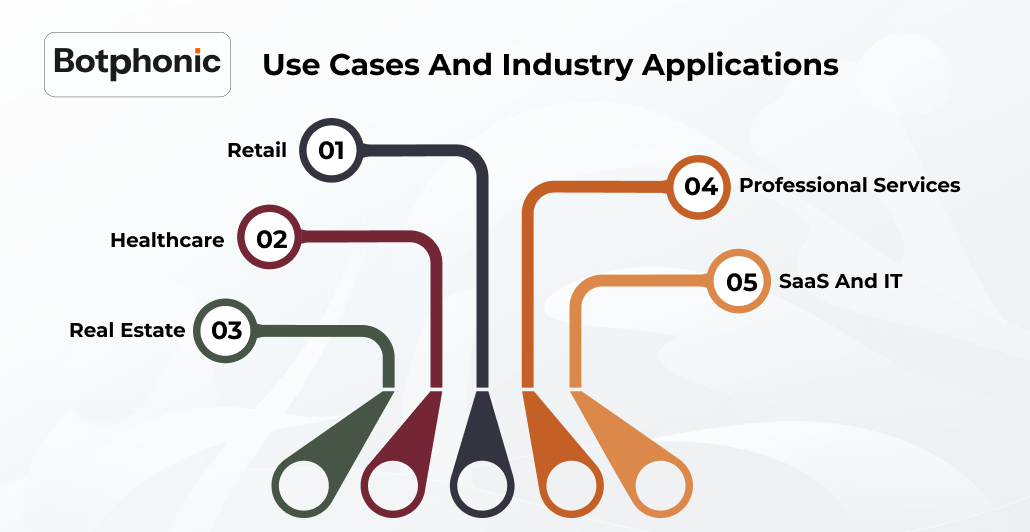
- Retail: Schedule appointments, handle customer care, and ensure the availability of stores around the clock.
- Healthcare: Appointments, reminders and direct calls to the appropriate specialist.
- Real Estate: Automate showings, capture leads, and get quality inquiries.
- Professional Services: Routing new client requests, providing feedback, and solving problems with service calls.
- SaaS and IT: Facilitate automated new onboarding calls, support lines, and out-bound customer calls.
Example Scenarios:
- Appointment Setting: Defragment reminders and confirmations, and minimise no-shows.
- Outbound Sales: In outbound sales, automated outbound calls should be employed to follow up and qualify leads.
- Service Calls: Provide details, troubleshoot and escalate problems automatically.
- Customer Surveys: Comply with customer surveys to improve the provided services.
Types of Automated Phone Systems
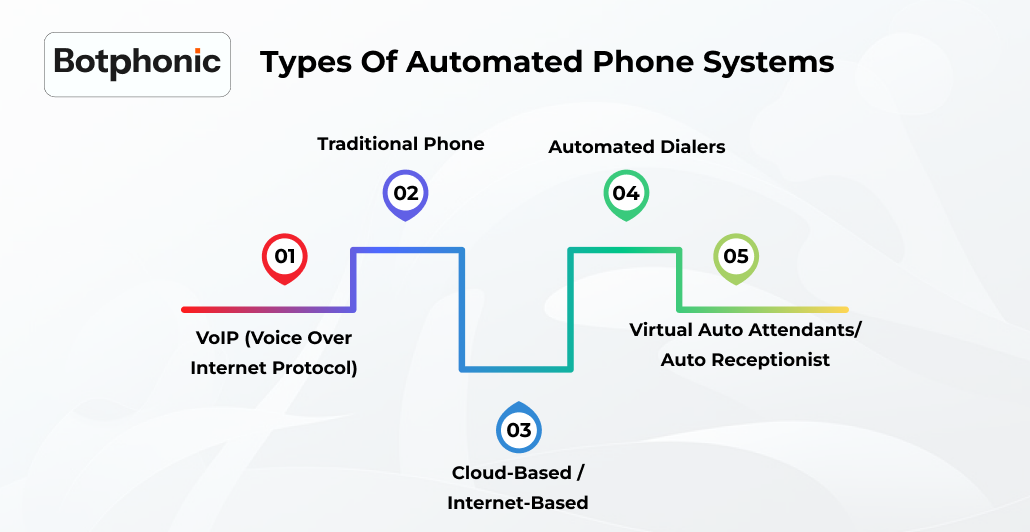
- VoIP (Voice over Internet Protocol): is cloud-based and internet-centric, which is appropriate in remote and hybrid teams.
- Traditional Phone: This is an analogue technology; it can be quite expensive, less flexible, and has only a few features.
- Cloud-Based / Internet-Based: Functions on cloud servers, easy to expand, intuitive, and can be used in any location.
- Automated Dialers: Progressive, preview and predictive dialer software are used to automate outbound calling campaigns.
- Virtual Auto Attendants/Auto Receptionist: Virtual auto attendants are multi-dimensional and offer self-service and complex routing; auto receptionists offer a simple greeting and direction.
Top Automated Phone Systems for Small Businesses in 2025
| System | Key Features | Price/Value | Pros | Cons |
| Botphonic AI | AI call assistant, multilingual, CRM/calendar sync, analytics | $0.08/min | Human-like voice, scalable, and feedback collection | Need an internet connection |
| Dialpad | Auto attendant, real-time transcripts, mobile app | $15/user/mo | Flexible, easy routing, great UI | Basic features on the cheapest plan |
| RingCentral | AI-powered, global/local numbers, scalable VoIP | Varies by plan | Powerful integrations, analytics | Can get expensive |
| Nextiva | Unified comms, easy setup, virtual auto attendant | From $18.95/mo | User-friendly, wide feature set | Extra costs for add-ons |
| Vonage | VoIP/cloud, call recording, analytics, custom menus | Custom pricing | Voice quality, CRM integration | Setup complexity |
| Grasshopper | Virtual auto attendant, multiple extensions, SMS | Starts at $26/mo | Mobile-friendly, simple setup | Limited analytics |
| Ooma | VoIP, virtual receptionist, call blocking | From $19.95/mo | Budget-friendly, good for micro-businesses | Limited customization |
| Exotel | Automated outbound calls, IVR, analytics | Custom | Indian market leader, rich API | Regional limitations |
| Lindy | Conversational AI agents, 30+ languages, no-code workflows | $49.99/mo | Powerful AI, customizable assistant | Premium pricing |
| Google Voice | VoIP, call forwarding, multi-device support | Free/business pricing | Simple, Google integration | Limited advanced features |
| MightCall, UnitelVoice, OpenPhone | Virtual numbers, auto attendant, analytics, and low cost | $10–$25/mo | Easy setup, affordable | Fewer advanced features |
Try it today, for instance, professional call management!
Try NowHow To Choose the Best Automated Phone System for Your Small Business
Factors to Consider
- Size of business: Select the plan and features you want, based on the number of calls and your team size.
- Industry Requirements: There will be different requirements in retail, healthcare or services.
- Stuff you need: CRM integration, call recording, analytics, and outbound dialers.
- Budget: Think of one-time and monthly spending, as well as add-ons (security, analytics, extra numbers).
- Integration Capabilities: Link your system to other already existing applications, such as scheduling, CRM and email.
- Reliability Support: Does the provider provide service guarantees and 24/7 tech support?
Evaluation checklist
- Determine challenges in operations (missed calls, bad routing, analytics).
- Write down important aspects that your team requires.
- CRM, calendar, SMS, email, and rank integrations.
- Draw a practical budget.
- Compare offers and testimonies given by trial users.
- Make sure that the provider has security and compliance measures in place.
Future Trends in Automated Phone Systems
- Artificial Intelligence-Based Auto Attendants: Chatbots where AI learns and dialogues through natural language and resolves problems.
- Predictive Dialing and Data-Driven Workflows: smarter outbound calling with CRM, historical performance and analytics.
- Integrated CRM: Sync caller information, history and preferences across networks.
- Omnichannel Communication: Bridge voice, SMS, email, web chat and messaging apps to provide a unified service.
- Sentiment Analysis and Voice Biometrics: Extra security and customer-specific experience.
Conclusion
Automated phones are the smartest move to make when it comes to saving time, reducing cost and creating a professional customer experience, but how do you find the best automated phone system to accommodate a small business?
Enjoy working smarter and growing with ease; whether you use a watered-down virtual auto attendant, an internet-based phone service, or an automated dialer system, the right solution will help your business grow without causing headaches. It is time to explore the options and find out how automation can help you manage each call.

